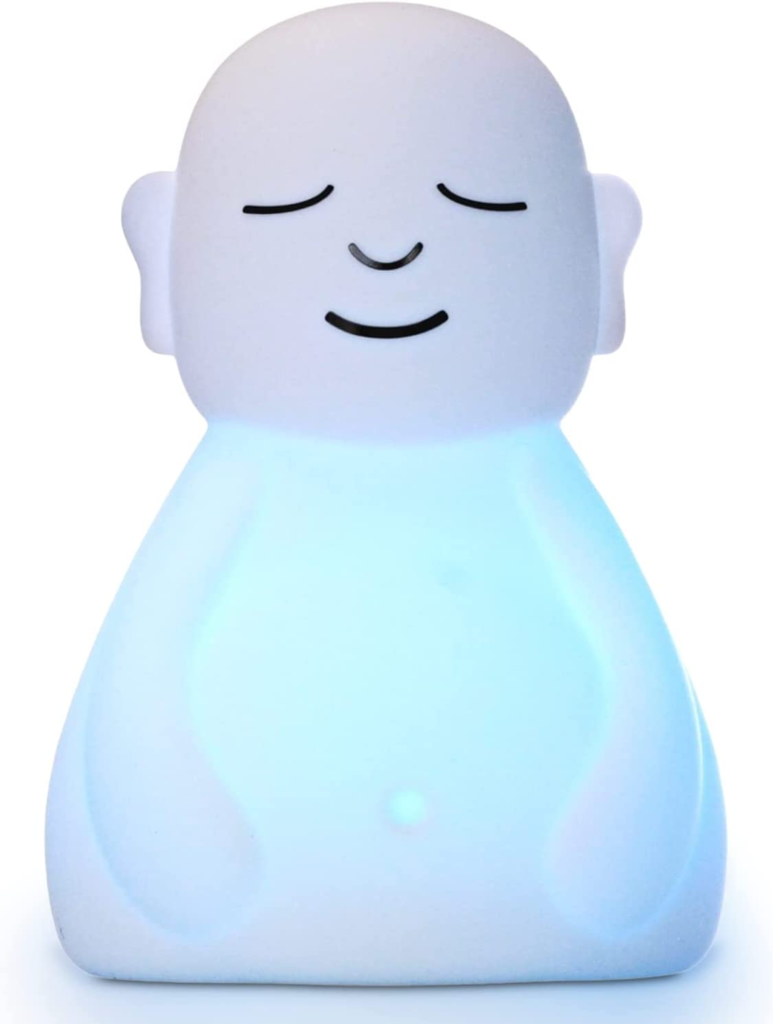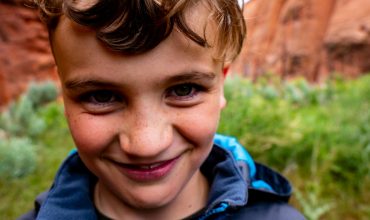
My son and his friends were bouncing off the couches watching a college football game this past fall. As the golden leaves fell outside, the mood lifted inside.
Finally, Michigan was having a strong season, and my son’s energy surrounding their success was catapulting out of his body.
During halftime, the commentators were chatting about Michigan’s quarterback, JJ McCarthy, saying he meditates daily, often right before a game on the field or in the locker room.
Of course, I had to throw my mom two cents by throwing in, “Wow, did you hear that, boys? Isn’t that cool that JJ McCarthy meditates?”
“Hmm,” my son replied, “Must be how he manages to be so calm all the time.”
And here, is where my son’s nightly meditation routine ignited.
What is meditation?
Meditation is a practice that involves focusing or clearing your mind using a combination of mental and physical techniques with the goal of relaxation or a tranquil mind.
Meditation is a thousands-year-old tool that modern science is now proving has great benefits. There are many different ways to meditate, including:
- Mantras
- Body-centered meditation (focusing on what you physically feel going on within your body)
- Movement meditation
- Mindfulness
- Visual-based meditation (looking at an object while clearing your head)
- Contemplation (considering one singular question without letting your mind think of other things)
- Guided (when one person leads another through clearing their thoughts and often focusing on breathing)
Meditation for tweens has many physical and mental benefits
You see, during the pandemic, I tried to get my son to meditate, do yoga, or practice mindfulness exercises on the daily.
Like everyone else in the country (or world), we grew irritable and quick to anger after staying home and together so much. I desperately wanted my son to try something to calm his mind and spirits, so, we tried several meditation apps and YouTube videos together.
Related: Six Of The Best Mindfulness Apps For Teens To Help Them Manage Life
Sure, while I got him to try meditation, it was always begrudgingly.
Until now.
For about six months, meditation is part of my son’s nightly routine.
Each and every night, he chooses a sleeping meditation, and either my husband or I rest next to him while we do it together. Because my son is a little athlete, he prefers using the Peloton app, but there are many meditation or mindfulness apps to choose from.
As a mom, this nightly ritual has developed into my favorite part of the day. Because as my son grows up, I know he will eventually say, “I think I want to meditate alone tonight, Mom.” So, this extra snuggle time together now feels like the perfect added time to connect with my adolescent son.
An added perk is that it’s even rubbed off on his little sister, who also chooses her own nightly meditation every night. The only drawback? Well, just be prepared to fall asleep with your kid sometimes.
Why is meditation good for pre-teens and teens?
On a serious note, though, I have seen my son change over the past few months because of his nightly meditation exercises.
Sometimes when he and his little sister get into it, he’ll take a giant breath and walk away.
This is leaps and bounds different from the yelling and poking that almost always used to erupt between the two of them.
Oh, and did I mention that meditation is also good for my son’s developing brain?
Related: The Best Way to Understand Your Teen’s Behavior Is to Start with Their Brain
According to Child Mind Institute, Dr. Amy Saltzman conducted a study with researchers at Stanford University “showing that after eight weeks of mindfulness training, a group of fourth through sixth graders in the study had documented decreases in anxiety and improvements in attention. They were less emotionally reactive and more able to handle daily challenges and choose their behavior.”
This is exactly what I’ve observed with my son. On top of the daily sibling struggles, he is less apt to jump at my husband and me when we are in disagreement about something.
Further, he can walk away from friend situations that seem unhealthy.
All in all, meditation allows my son to pay attention to his breathing and calm his nervous system so that he can slow down and notice his feelings.
There’s even more research, too. According to Psychology Today, “because mindfulness can promote skills that are controlled in the prefrontal cortex of the brain, like the ability to focus and concentrate, it is especially useful for children.” Further, there is also a recent study, published in the journal, Mindfulness, in June 2018, which “showed especially good results with late adolescents ages 15 to 18.”
In our home, I have seen my son’s ability to focus increase tremendously since he started his meditation practice. When he comes home after school, he sets his books on the kitchen table and gets right to his homework. His executive functioning, time management, and concentration have all improved, so his schoolwork has progressed as well.
All in all, Dr. Saltzman “prefers not to define the word but rather to invite the child to feel the experience first—to find their ‘still, quiet place.’”
So, it’s no wonder why JJ McCarthy can still throw an accurate spiral to his wide receivers despite a giant defensive line barreling his way. He’s somehow always in his own “still, quiet place.”
While our kids may or may not be football players, they still face daily struggles and pressures. Meditation is worth the hype—and can help calm the whole family’s spirits.
Are you interested in helping your tween or teen learn how to meditate?
The team at Parenting Teens & Tweens loves this product, The Breathing Buddha, which is a guided visual meditation tool for mindfulness. The small, cute silicone structure is easy to follow with fade-in, fade-out color prompts that simulate the popular 4/7/8 ‘calming breath’. Green Buddha – Inhale , Purple Buddha – Hold, Blue Buddha – Exhale.

Are you in the thick of raising your tweens and teens? You may like this book by Whitney Fleming, the co-owner of Parenting Teens & Tweens: Loving Hard When They’re Hard to Love: Essays about Raising Teens in Today’s Complex, Chaotic World.

Parenting teens and tweens is hard, but you don’t have to do it alone. Here are some other posts parents found helpful:
Five Simple Ways to Teach Your Teen How to Self-Advocate
Five Empowering Things to Say to Your Anxious Teen
Six Tips to Prepare Teens to Take Charge of Their Health and Wellness
Comforting and Stress-Reducing Gifts to Help Your Anxious Teen
*This post may contain affiliate links where we earn a small commission for products purchased from our website.





Leave a Comment